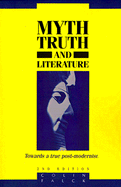Book contents
6 - Towards a true post-modernism
Published online by Cambridge University Press: 03 May 2011
Summary
I require of you only to look.
st. teresa of ávilaDespite the unwillingness of post-structuralist theorists themselves to recognize the fact, the most central of the doctrines of post-structuralism – above all that the significations of our human signs are relational, and that there is no “self” except as a part of structure – can in the end be seen to be disguised (we might perhaps do better to say travestied) versions of certain very traditional religious notions. The first of these doctrines, if we view it from only a slightly more traditional angle, means that the world is One. The second – if we are to be allowed to retain any concept of a “self” at all – means that we are members one of another. Through its elimination, for linguistic purposes, of the subject–object view of human life which is basic to post-Cartesian “humanism,” post-structuralism opens the way to a truly aesthetic comprehension both of language and of imaginative literature. By taking the focus of attention away from the author and by placing it on the words themselves – an emphasis which is in fact already central to Romantic philosophy since the time of Schiller's Aesthetic Education – post-structuralism provides us with a new way of abstracting our treatments of expressive language from the instrumental or manipulative functions of the practical world. In the realm of poetry or literary fictions it is indeed, as Heidegger says, “language that speaks,” and not man [as conscious ego] himself.
- Type
- Chapter
- Information
- Myth, Truth and LiteratureTowards a True Post-modernism, pp. 147 - 170Publisher: Cambridge University PressPrint publication year: 1994



